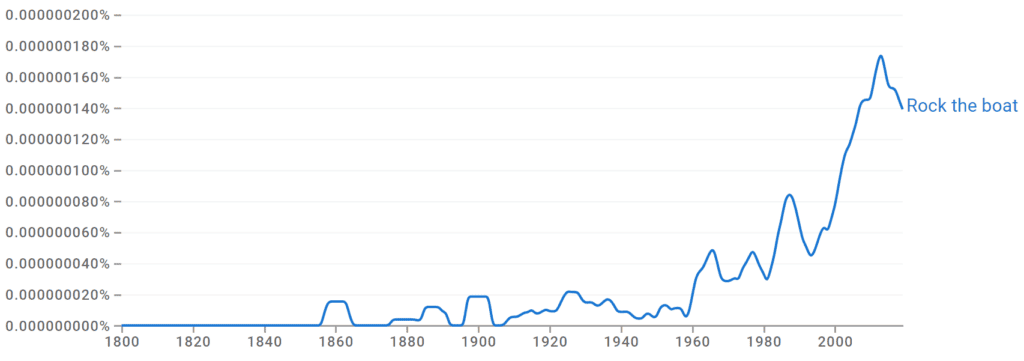An idiom is a word or series of words with a figurative use different from its literal use. Although idioms derive from a literal meaning, their usage often changes through years of use to create analogies for a more interesting sentence structure.
They can be confusing, however, to anyone unfamiliar with their use. To rock the boat means to make trouble and creates a literal illusion of one “upsetting” or “rocking” a boat to create a dangerous situation. However, the term’s origins are quite the opposite in meaning, and the idiom “rock the boat” is the perfect example of how the meaning of something can change through the years.
Let’s explore the history behind the idiom rock the boat so you can use it in your own materials.
What Does It Mean to Rock the Boat?

The modern use of the idiom rock the boat means to make trouble, to upset the status quo, or to disturb the harmony of something. It is often expressed in the negative as a warning: don’t rock the boat.
It can also be used to highlight difficult, albeit positive, changes that an individual or group is attempting to create. When used in this manner, it is usually suggested that the ideas or actions required to bring about change will be met with resistance but that the effort is worth the results.
Sentence Examples of Rock the Boat
- The question remained, would Sarah face acceptance, or would she be forced to rock the boat in her attempts to bring the much-needed change to the club?
- With the much anticipated yet controversial bill coming up for a vote, you would have thought the bill’s sponsor would have refrained from rocking the boat in advance.
- The business refrained from rocking the boat with its controversial political opinions, with so much of its advertising coming from a spectrum of different global companies.
Rock the Boat Origins

The actual origin of the idiom “rock the boat” is ancient in its use. Wooden boats are extremely buoyant, and rocks, called ballast stones, were used to help offset the top-heavy weight of many ships.
Ballast stones were often large river rocks and were added and removed as needed to help balance cargo, supplies, crew size and even military cannons hence the term “to rock the boat.”
The original “rocking” of a boat was to add stability. However, through the years, the term took on a different meaning—likely through a misinterpretation of the use of the word “rock” in this context, which can also mean a back-and-forth movement.
Today, the modern use of the term is attributed to William Jennings Bryan—a politician and talented public orator. Bryan was a Democrat from Nebraska who unsuccessfully ran for president three times. In a speech reported on by the Boston Globe in 1914, he coined the idiom: “The man who rocks the boat ought to be stoned when he gets back on shore.”
Rock the boat and don’t rock the boat are still popular idioms today, often used as a rallying cry for political or social change.
Let’s Review
To rock the boat has a very different meaning today than its initial inception. Placing rocks in a boat, or rocking a boat before a trip, used to mean adding ballast to help offset the boat’s buoyancy and keep it balanced so it wouldn’t tip over and sink.
To rock something also means to move back and forth, and the term understandably was misinterpreted to mean not to cause a rocking movement to avoid tipping over. When somebody exclaims that you shouldn’t rock the boat, they mean you must stop creating unnecessary conflict or trouble.
However, the term also means to shake things up and can be used to force positive change or make people see things from a different perspective.
Want to know more idioms? Check out some others we covered:
